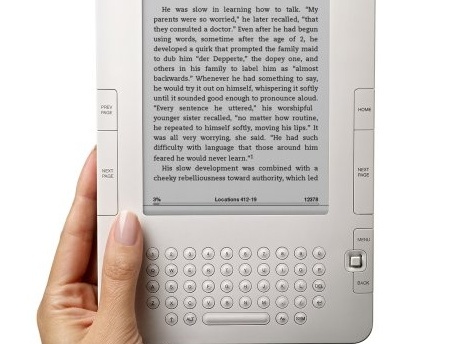Penguin: eBooks encourage faster reading

All the major book publishers are fully supporting the eReader revolution, with a Penguin eBook rep claiming that devices such as Amazon's Kindle and Sony's Reader encourage faster reading across a broader range of content.
The news follows this week's launch of the new eBook on the block, Amazon's rather slim, nifty and feature-packed Kindle 2.
"I'm really excited by it and see it as a huge improvement clearly based on constructive consumer feedback," Penguin's Group Digital Director, Genevieve Shore told TechRadar, after having an initial first play with Amazon's new device.
"It is much more user friendly and I'm particularly impressed by improved screen clarity, extended battery life, portability and ability to switch fairly seamless between titles and news content."
And while Shore didn't want to speculate on timing, it looks pretty likely from a number of TechRadar's sources that Kindle 2 will also be launching in the UK later in 2009.
Cute toy for noodling with
One high-ranking copyeditor who works for a leading US publisher told us that she thought Amazon's Kindle was "a cute toy" yet even though she was impressed when "noodling around with my friend's Kindle by its friendly presentation and usability" she was still "thoroughly unmoved to have one be part of my life."
Sign up for breaking news, reviews, opinion, top tech deals, and more.
However, the same editor was not as impressed with Sony's Reader, which she considered both "clunky and awkward."
So what does the growth of the market for eReaders and eBooks mean for authors, publishing houses and readers?
"It's hugely exciting for all three parties" says Penguin's Genevieve Shore. "For publishers and authors, it's the chance to reach new readers and provide a new way to access content. For readers, it's about providing more choice in terms of how they access content.
"Anecdotal evidence suggests that e-readers (people rather than the devices) read faster and across a broader range of content which is a good thing for everyone."
YouTube for new writers
Our US publishing source added that: "For authors we are more likely to see the rise of self-publishing and micro-distribution modelsfor unknown or unconnected authors. It will be more YouTube-like overnight superstardom for some, which will lead to traditional book deals with major publishers."
She added that eBooks will also provide publishers with a much-welcome supplementary income stream. While book sales overall "have been down in the recession economy, eBooks have been on the rise, especially for throwaway business titles or airplane reading."
So might we see the end of the printed book within the next ten years?
"Absolutely not," claims Penguin's Genevieve Shore."The eBook numbers are still very small - though growth is pretty phenomenal. This is about providing an alternative way of accessing content and a way to reach new readers.
"At Penguin, we believe that by providing content in avariety of formats, we will be able to provide readers with the means to access our content however they want. The physical book will continue to be one of those formats."
Our US publishing source is just as adamant that eBooks do not spell the end of print, as some over-excited commentators have suggested.
"Not a snowball's chance," she told TechRadar. "There is a large segment of the reading population with an intractable commitment to the printed book. The tactile pleasure of holding a book and turning its pages cannot yet be replicated in a digital environment. Until and unless it can, physical books will remain in demand.
"Why reinvent the wheel when the wheel has been doing well by us for thousands of years?"
